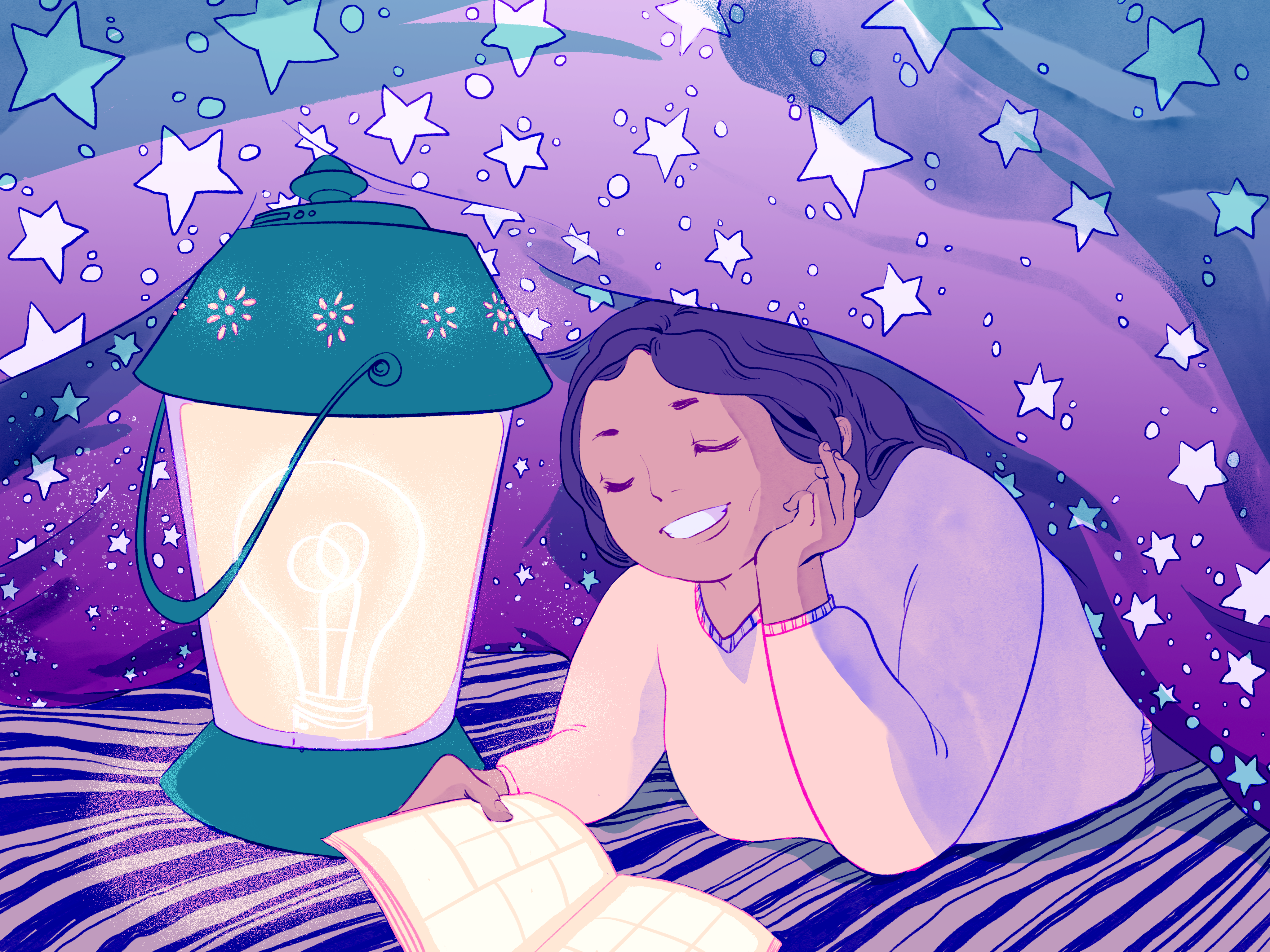I didn’t recognize myself for some time.
Growing up in rural Alberta, I never saw people like me. To be fair, I didn’t really know what a person “like me” looked like. As a teen, I wore Hollister T-shirts and had braces and bangs. I played the tenor saxophone and liked the Twilight movies. I had no concept of dating girls or boys, or being lesbian or bisexual or straight.
I was just me.
I read voraciously. Books earned dog-eared pages at long family camping trips, in the back of my mom’s car and on my bedside table. I always had a book with me, and it would be from these that I formed my outlook on life: how to build friendships, how to overcome challenges, how to be true to myself.
And then one December night during my undergrad while back home for the winter break, I found myself in my childhood bedroom, clutching the corners of Alison Bechdel’s Fun Home — seeing myself represented for the first time.
“I had been looking for someone like me for years.”
Fun Home is a graphic memoir that details Bechdel’s coming out journey as a young lesbian while paralleling that to the revelation of her father’s homosexuality and eventual suicide. The narrative dances between Bechdel’s memories of the past and her musings in the present as she processes the trauma of her father’s death. But there in my parents’ basement, it was the queer moments I fixated on.
I had been looking for someone like me for years. At my high school, there had been one out lesbian couple I knew of. I remember always seeing them holding hands in the hallway and thinking about how happy they looked.
There was also one queer guidance counsellor, though students rarely spoke about the woman who came to visit class sometime or drop their son off after school. When we did, to us she was just Ms D’s — and other kids would always pause dramatically, their voices dropping into a forbidden whisper — “partner.”
“Clutching the corners of Fun Home, I saw myself just as Bechdel saw herself in that bookstore.”
My high school pre-queer education comprised of The Ellen Degeneres Show afternoon screenings when I went home for lunch. My mom, supportive and likely suspicious of things I didn’t yet know, would always lean over and comment on how “nice and happy” Ellen and her wife Portia de Rossi looked together. And then I moved away to university, my queerness looming on the periphery of my vision, never really present in my mind.
That moment in my childhood bedroom when I was 19, I recognized the portrait Bechdel paints of her younger self: the rejection of traditional femininity at an early age, the small town, the literary-inclined parent. It felt like I was reading my own life’s story.
I would pause at certain moments to lay the book down across my knees. As I thought about the words, a warmth spread across my body. An uncontainable smile would broke on my face. It felt so much more personal than the required reading for a second-semester course it was.
There’s a part in the text where a college-aged Bechdel comes to her own realization when she picks up a book on lesbianism in a bookstore. For Bechdel, this book is the first of many and eventually leads to a trip to the gay union where she meets the first girl she falls in love with.
Clutching the corners of Fun Home, I saw myself just as Bechdel saw herself in that bookstore. In that moment, we were mirror images: both of us 19 years old, nervous and curious, discovering new things about ourselves in the familiar bookish form.
“Seeing myself in that moment wasn’t a forceful awakening, but more like a blurry picture finally sharpening into focus.”
I saw my future too: me bringing a girlfriend home to meet my parents at Thanksgiving, meeting other queer people and sharing in their experiences, reflecting on this moment decades from now with a filter of nostalgia.
Seeing myself in that moment wasn’t a forceful awakening, but more like a blurry picture finally sharpening into focus. My emotions were always there, but it just took a slight tweak to understand what those indistinct shapes actually were.
And once this image gained clarity, I couldn’t look away.
Four months after reading Fun Home for the first time, I came out to my best friend Kate over lunch on a Sunday afternoon. A few months later, I would call my family from a stairwell outside the student newspaper office I worked in and do the same.
Later that year I’d cut my hair short and start to further embrace the newfound masculinity I was now comfortable with, carrying my keys in a ring on my belt just like the butch woman a young Bechdel describes seeing in Fun Home, recalling that I felt a pang of indescribable familiarity with her.
“Four months after reading Fun Home for the first time, I came out to my best friend.”
It would be inaccurate to ascribe my grand queer realization simply to Bechdel’s influence — my friends and family from high school will attest they knew long before I picked up that book in university. I probably did too.
And despite the role I’ve ascribed it in my queer story, there is only so far my identification with Bechdel’s book can go. Her coming out journey is hers; mine is mine. Bechdel’s queer identity is deeply intertwined with her father, trauma and tragedy in a way I will never understand. It happens during another time in another place with other people.
While I may find connections, I can’t force parallels between my family and hers, my first love and hers, or my story and hers.
I bought a second copy of Fun Home to lend out for people to better understand me. And there’s something ironic about how I pass people someone else’s memoir when I want them to know me.
My story has continued down its own path, a road that forked when I first read Fun Home. While back in high school I never imagined falling in love boys or girls, I later had my share of crushes and I fell in love with a girl who always laughs at my bad jokes. I left Alberta for grad school and moved to a neighbourhood in East Vancouver full of people who look like me and share my experiences. I now go to Judith Butler reading groups and lead lectures on queer activism in journalism.
“My story has continued down its own path, a road that forked when I first read Fun Home.”
I still come out to different people in different ways every day, whether by introducing myself as “aggressively gay” or simply presenting as the soft butch I know I’m meant to be. I faced my own challenges and grown into the person I am now. I’ve told my story dozens of times in writing and on stage. I’m constantly weaving a narrative of my own queerness. And almost most notably in contrast to Bechdel, I’ve been fortunate to have a family that’s stood by me throughout that process.
Shortly after I came out, my parents and younger sister travelled to New York and saw the Broadway musical adaptation of Fun Home. They brought me back a T-shirt featuring silhouettes of patrons outside a Broadway theatre, one with a speech bubble that reads, “that was exactly like my family. But totally different.”
That’s the role Fun Home played in me coming into my queerness — exactly like me, but totally different.



 Why you can trust Xtra
Why you can trust Xtra


